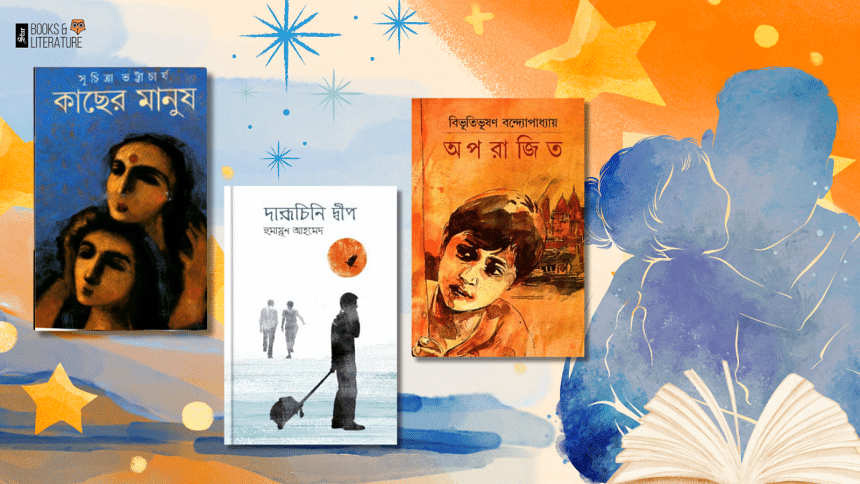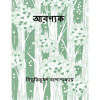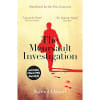4 Bangla books with tender yet complex father figures

In Bangla literature, mothers often dominate the emotional narrative. However, beneath that maternal warmth lies a quieter current—of fathers who fumble, fathers who sacrifice, fathers who, in their own way, love with an intensity they cannot always put in words. These paternal characters are not easy to love, nor can they love faultlessly themselves. Yet it is precisely this contradiction—their awkward tenderness, silent failures, and undeniable devotion—that makes them so achingly human. Here are four Bangla books that gift us fathers who are far more than just supporting characters. They are broken, brilliant, and brave. Sometimes distant, sometimes suffocating. Ever complex.
Shambhunath Sen from Aparichita
Rabindranath Tagore
Benzin Prokashon, 2023
Rabindranath Tagore's Aparichita may centre around Anupam, the aimless, somewhat slow-witted young man, and Kolyani, a fiercely independent woman, but today, we want to shift the spotlight away from them. Instead, let us talk about someone quietly remarkable: Kolyani's father, Shombhunath Sen. He is not the typical loud, overbearing patriarch we often see in literature. Shombhunath is soft-spoken, reserved, and calm, an unassuming strength rather than a commanding presence.
Yet, his influence on his daughter's upbringing is unmistakable. He has raised Kolyani to stand tall, to think for herself, to make her own choices in a world that rarely caters to women. That is precisely why, when Anupam's Mama insulted them on the wedding day, Shombhunath did not hesitate for a moment to call off the marriage. He cared little for the whispers and judgments of society, those shallow voices that often trap women in unfair narratives. What mattered to him was his daughter's dignity and well-being. By standing firm against the expectations and pressures of tradition, he chose to protect Kolyani's honour above all else.
Iajuddin from Daruchini Dwip
Humayun Ahmed
Anupam Prokashoni, 1990
One of Humayun Ahmed's famous literary pieces, both onscreen and in writing, Daruchini Dwip follows a group of university students on their ambitious voyage across Bangladesh. At the heart of this story is Shuvro, a quiet observer, a thinker, someone who feels the world more deeply than he lets on. As the only son of his parents, it is fairly unsurprising that Shuvro has grown up in a tightly knit cocoon of care, especially from his father, Iajuddin. A man of strong opinions and stronger silences, Iajuddin is the classic Bangladeshi patriarch: principled, rigid, and unrelentingly protective. In his eyes, love is best expressed through control, and safety is worth more than freedom.
Though Shuvro is well into his twenties, his father still struggles to see him as someone capable of steering his own course. This, appropriately, gives rise to a strained relationship between father and son, two people bound by love, yet often speaking in incompatible languages. Shuvro, for all his understanding and empathy, finds it hard to constantly bow to expectations he no longer agrees with. On the other side stands Iajuddin, trapped in the familiar parental dilemma: how do you let go of someone you have spent your whole life holding close? He is terrified, not of rebellion or defiance, but of the heartbreaking possibility that one day, his son might not need him anymore. And so, in trying to protect Shuvro, he often ends up holding him back.
It is a push and pull that feels achingly familiar. After all, is that not what growing up really is?
Aditya and Shubhashish from Kachher Manush
Suchitra Bhattacharya
Ananda Publishers Private Limited, 1998
Few contemporary Bangla novels navigate the tangled terrain of love, loss, and legitimacy as deftly as Kachher Manush. Bhattacharya crafts a nuanced portrait of emotional contradiction and fractured parenthood. The book traces the journey of Titir—a girl unknowingly born from an affair between her mother, Indrani, and her former lover, Shubhashis, a once-fiery revolutionary who had disappeared into political idealism and returned years later with a wife and child. By then, Indrani had long since married Aditya, a distant but dependable husband with whom she shared a functional, if emotionally hollow, life.
When Shubhashis re-entered the picture, the past quickly resurfaced, and from a brief, impulsive moment, Titir was born. Yet it was Aditya who raised her, never suspecting a thing. The genius of Bhattacharya's narrative lies in her handling of the dual father figures in Titir's life. Aditya, the legal father, is all structure and control: duty-bound, emotionally reserved, and ultimately unaware of the truth. He provides everything but intimacy. Shubhashis, in contrast, is weighed down by knowledge he cannot act on. His presence in Titir's life is peripheral yet quietly charged, shaped by suppressed responsibility.
Titir grows up in the middle of this unspoken arrangement, claimed by one man, created by another. Neither father is abusive or cruel, but both are compromised, locked in different versions of denial. What emerges is a sharply drawn portrait of fatherhood as performance, and of a child suspended between two men who each represent different kinds of absence.
Apu from Aparajito
Bibhutibhushan Bandyopadhyay
Dey's Publishing, 2014
Aparajito delves into the emotional turmoils of fatherhood, capturing the pain of loss and the hope of reconciliation. It is a nuanced connection between Apu and his son Kajol, a relationship marked by both absence and enduring love. After the sudden death of his wife Aparna, Apu finds himself trapped in a whirlwind of grief, unable at first to embrace Kajol as his own. Haunted by Aparna's memory, his rejection of Kajol is a defence mechanism, a source of silent pain. Meanwhile, Kajol's unconditional love for his father shines through, unwavering even when met with distance and restraint. The novel's true power unfolds in the slow, tender way Apu learns to see Kajol not as a painful reminder of loss, but as a living connection to the partner he mourns. This recognition transforms their relationship, allowing father and son to move beyond abandonment and isolation, on the path of a new beginning. Together, they navigate the fragile trajectory of healing, building a bond rooted in understanding, forgiveness, and hope. Aparajito masterfully captures the evocative complexity of a father's progression from sorrow to acceptance, and a child's steadfast love that never falters.
Nur-E-Jannat Alif is a gender studies major and part-time writer who dreams of authoring a book someday. Find her at @literatureinsolitude on Instagram or send her your book/movie/television recommendations at [email protected].

 For all latest news, follow The Daily Star's Google News channel.
For all latest news, follow The Daily Star's Google News channel. 








Comments